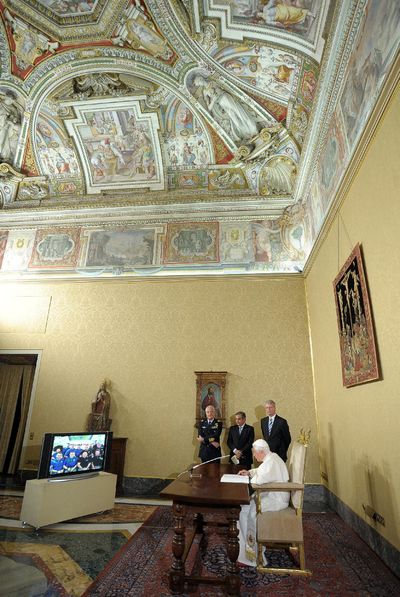Benedict makes first papal call to outer space

CAPE CANAVERAL, Fla. – Pope Benedict XVI had a direct line to the heavens Saturday, with NASA’s help.
Speaking from the Vatican, the pontiff bestowed a historic blessing upon the 12 astronauts circling Earth during the first-ever papal call to space, wishing a swift recovery for the shuttle commander’s wounded congresswoman wife and condolences for a station astronaut mourning his mother’s death.
The “extraordinary” conversation, as Benedict described it, occurred after the Endeavour astronauts inspected a small gash in the shuttle’s belly, to ensure their safe return to Earth after departing the International Space Station in just over a week. NASA later determined the damage posed no threat to the next-to-last flight in the 30-year shuttle program.
Seated at a table before a television set tuned to NASA’s live broadcast from orbit, Benedict told the space travelers that “you are our representatives spearheading humanity’s exploration of new spaces and possibilities for our future.” He said he admired their courage, discipline and commitment.
“It must be obvious to you how we all live together on one Earth and how absurd it is that we fight and kill each one,” the pontiff said, reading from prepared remarks. “I know that Mark Kelly’s wife was a victim of a serious attack, and I hope her health continues to improve.”
Kelly, who is of Irish-Catholic descent, thanked the pope for his kind words. His wife, U.S. Rep. Gabrielle Giffords, had surgery to repair her skull Wednesday, four months after being shot in the head at a political event in Tucson, Ariz.
Kelly told the pope that borders cannot be seen from space and noted that down on Earth, people usually fight for resources. At the space station, solar power provides unlimited energy, “and if those technologies could be adapted more on Earth, we could possibly reduce some of that violence,” he said.
Benedict asked about the future of the planet and the environmental risks it faces, and wanted to know what the astronauts’ most important message would be for young people when they return home.
Space station astronaut Ronald Garan Jr. spoke of the paper-thin layer of atmosphere “that separates every living thing from the vacuum of space.” And shuttle crewman Mike Fincke described how he and his colleagues “can look down and see our beautiful planet Earth that God has made.
“However, if we look up, we can see the rest of the universe, and the rest of the universe is out there for us to explore,” Fincke said.